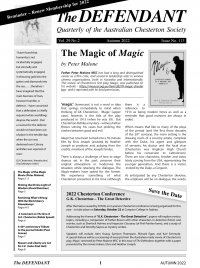Chesterton’s great work of Christian sociology, What’s Wrong with the World (1910), has been often overlooked or under-rated in the corpus of his writings. Yet it contains many of his most penetrating insights into the foundations of society, beginning with the family. It reveals, in particular, the perverse alliance that we continue to live with in the 21st century, between over-large companies in collusion with over-large governments and bureaucracies. Garry Nieuwkamp, a doctor on the NSW Central Coast, looks again at a Chesterton classic.
What’s wrong with the world, asked G. K. Chesterton? Lots apparently.
Published in 1910, the book’s title is a reminder of Ches- terton’s quip – that, on being asked by The Times news- paper this very question, “What’s wrong with the world?”, allegedly was: “I am”.
This is Chesterton as many of us remember him – insightful but brimming with mirth. It is also a reminder that he was ever the spiritual clinician taking the pulse and prescribing a tonic to the world he saw in decline.
In a much later book that gathers together essays that give an account of his conversion to Catholicism, Chesterton sums up in one paradox what is wrong with the world.
“In the matter of reforming things, as distinct from deforming them, there is one plain and simple principle; a principle which will probably be called a paradox. There exists in such case a certain institution or law; let us say for the sake of simplicity, a fence or gate erected across a road. The more modern type of reformer goes gaily up to it and says, “I don’t see the use of this; let us clear it away.” To which the more intelligent type of reformer will do well to answer: “If you don’t see the use of it, I certainly won’t let you clear it away. Go away and think. Then when you can come back and tell me that you do see the use of it, I may allow you to destroy it.” (“The Drift from Domesticity”, The Thing, 1929)
Not being able to understand what a thing is for is a criticism that is at the heart of What’s Wrong With the World: “What is wrong is that we do not ask what is right.” As Aristotle writes in the opening of the Nicomachean Ethics: “If like archers, we have a target, are we not more likely to hit the target?” If one doesn’t know what the ideal is, then hitting the mark is a shot in the dark with fingers crossed.
This is the problem epigrammatically expressed: “The business of Progressives is to go on making mistakes. The business of Conservatives is to prevent mistakes
from being corrected.” Illustrated London News, April 4, 1924) “Hudge and Gudge are secretly in partnership” is Chesterton’s suspicion.
If this is the diagnosis, what is the restorative? For Chesterton “Men invent new ideals because they dare not attempt old ideals. They look forward with enthusiasm because they are afraid to look back.”
Chesterton does not want to disenfranchise those who have gone before. It is not that they necessarily had the wrong ideals but that they failed to live up to those ideals. “The problem with Christianity,” as one of those ideals he writes, “is not that it has been tried and found wanting but that it has been found difficult and left untried.”
So too with the democratic dream; “It has in a strict and practical sense been a dream unfulfilled”.
So Chesterton’s solution is to weave into the fabric of society those ideals based on family, private property and a nurturing of a deep spiritual life: “The idea of private property universal but private, the idea of families free but still families, of domesticity democratic but still domestic, of one man one house- this remains the real vision and magnet of mankind.”
The family provides a counterbalance to the State: “It may be said that this institution of the home is the one anarchist institution. That is to say, it is older than law, and stands outside the State”.
“If we want to preserve the family,” he writes, “we must revolutionize the nation”. The problem, though, is that it is to “the State, the School, the modern machinery of taxation and police”, to which people actually look to save themselves from the superstition of their fathers”. That is the contradiction at the heart of what’s wrong with the world, and it will inevitably lead to a crashing collision. Not only have we lost our way, he writes, we have lost the address!
We have taken a wrong turn, says Chesterton, and we are told we must go forwards not backwards. To what end he would ask? We have lost our way; must we lose the map as well? Because we have missed our ideal, must we forget it? It is a modern heresy of “altering the human soul to fit its conditions, instead of altering human conditions to fit the human soul”.
Chesterton wants neither big government nor big business but a society that puts the family and the freedom centre stage: “As every normal man desires a woman, and children born of a woman, every normal man desires a house of his own to put them in. He does not merely want a roof above him and a chair below him; he wants an objective and visible kingdom; a fire at which he can cook what he likes, a door he can open to what friends he chooses”.
This sound suspiciously like Chesterton’s home at Beaconsfield – and an ideal definitely worth preserving.
